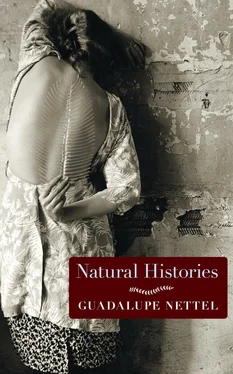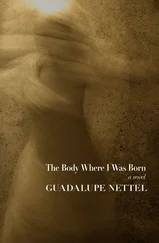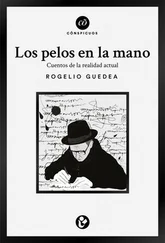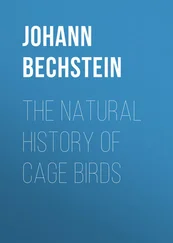In one of these early morning hours in which I’d go downstairs to pour myself a glass of milk I discovered a cockroach, dark brown in color, at a standstill in front of the cupboard. It was like that insect was looking at me, and in its eyes I recognized the same surprise and suspicion that I felt toward it. Then it began running around helter-skelter. Its nervousness disgusted me, and yet, it also felt familiar. Or was it the feeling of familiarity that repulsed me? I can’t say. What I do know is that I left my glass on the table and ran terrified to my bedroom. But I couldn’t sleep. There were two things on my mind: my cowardly behavior at the sight of a miserable bug and the glass of milk that I’d left on the table. After thinking about it for some time I mustered enough courage to go back downstairs. I found the insect still on the floor. This time it wasn’t fear I felt, but an unbounded loathing. I lifted my foot and with the bottom of my sandal stamped it into the tile. The impact produced a crunch that sounded deafening in the dead silence. I started to head back upstairs when I heard the appalled voice of Clemencia, a few feet away.
“If you don’t pick her up and get rid of her,” she said to me, “her relatives will come looking for her.”
The old woman gracefully bent down and picked up the corpse in her hand and wrapped it in a napkin. There was a certain solemnity about her, as if she were performing a funeral rite. She then opened the back door to the patio we shared with neighboring houses and placed it in a potted plant.
We went up to our rooms in silence. Once on the terrace, Clemencia began her lamentations.
“What got into you?” she said, as if to herself. “They will probably invade us now.”
I lay in bed for hours, turning it over in my mind. Even to an eleven-year-old, what Clemencia had said sounded a little absurd. In my insomnia I wondered what would happen if Clemencia were right and, if so, what were family ties between cockroaches like? What obligations and rights did they have within their clan? And this family, was it just one, interminable family that inhabited the whole earth, or were there distinctions between the different branches? When at last I fell asleep I dreamt of a funeral procession of cockroaches. The one I had flattened with my foot was lying amidst a throng, like a fallen hero or beloved poet. I felt certain they would never forgive me.
Clemencia was not wrong. Shortly thereafter, cockroaches invaded my aunt Claudine’s house. They didn’t all come at once, like hordes of Vikings ready to conquer the land. But like guerrillas avoiding detection, surreptitiously they took over the cupboard. Then the entire kitchen. A few days later Isabel called her employer in to tell her the news. I found myself near them just at that moment, and so I saw my speechless aunt’s severe and commanding frown. I couldn’t get it out of my head that the invasion was my fault. I thought she was going to fire Isabel, but instead, when at last she decided to say something, it was to establish a plan of attack. It would begin with the lowest-grade poison. If that didn’t work within seventy-two hours they would call the exterminator. Isabel nodded gravely. Her legs were close together and her back was straight, like a soldier’s. Before she left, Claudine paused in the doorway and asked the maid to make her lime blossom tea and bring it to her in bed.
“Don’t tell anybody,” she said. “This is to stay between us.”
But my aunt did not stick to the original plan. Whether it was because she was too proud or too ashamed in front of the neighbors, the exterminator never came to the house. Instead, in the following weeks we saw a rotation of all kinds of traps and poisons meant to mitigate the plague. The most impressive was a type of glue that a few cockroaches got stuck in and left behind a shell, or sometimes just a leg. Unfortunately, the trap didn’t kill them. Nor did it sterilize them. Even mutilated those insects continued reproducing rapidly, populating the cupboards and the shelves where the spices were kept. My aunt was the strategist and Isabel the executer. For the latter, the affair with the cockroaches was a personal matter, the long-awaited opportunity for her to prove her loyalty to the family. The sympathy Isabel inspired in me made of me an accomplice in her war. Every night I helped her sprinkle the corners of the house with an odorless white product that supposedly drove away the insects. However, the only result from this new substance was the death of a mouse whose existence meant nothing to us. My aunt Claudine on the other hand preferred aerosol. When neither her sons nor her husband were home she’d appear in the hallways with a face-mask and a can, her formidable bearing reminiscent of a soldier carrying heavy firearms. I could hear the sound of the aerosol from my room and it made me shiver. Isabel and my aunt spoke of nothing else. It was like the insects’ presence consumed them. In contrast, my cousins never brought it up. More than once I wondered if Claudine remained firm in her resolve to keep them out of it or if they themselves preferred to fake dementia. I suspect they knew about it, but fearful of their mother’s nerves or maybe just indifferent, they decided to play dumb and not say anything about it. Until my aunt brought it out into the open in order to step up preventative measures.
“It’s important,” Claudine said to all us, “to be extra careful with food. Dirty plates must not be left in the living room or TV room. I don’t want to see a single crumb on the floor.”
My cousins earnestly adopted all the hygienic measures their mother imposed. So did I, becoming a stranger to myself. Before, when I saw a spider or Jerusalem cricket in the playground at school, my reaction had always been calm and unconcerned. And now I considered those bugs a matter of life and death. The zeal quickly rubbed off on my cousins. Every time a cockroach appeared in the bathroom or on someone’s pillow, the entire family came to pester it, Isabel and me included. It was no longer a question of social class but a full-on war between species. Those insects had invaded not only the drawers and cupboards, but also the cracks in our mind. Anyone who has suffered them knows I’m not exaggerating when I say that ultimately, cockroaches almost always become an obsession.
Clemencia was the only one who stayed out of the whole affair. Her behavior seemed strange to me, especially after her outburst that first night. I was sure that she knew many things about our enemies, and yet she revealed nothing. She would only speak sarcastically, once in a while, about our aggressiveness:
“That’s the rich for you,” she’d say. “Agonizing over the littlest thing. Look at them, you’d think the blight was upon them.”
She was forgetting that her own daughter was one of those leading the attack on the insects.
According to what she’d said that night, cockroaches have codes and rituals, at least around death. I told myself that it was crucial to observe their behavior more systematically, and that from such observation the keys to how to annihilate them would become apparent.
The enemy seemed unfazed by our attacks. The cockroaches walked around the house so defiantly it seemed like arrogance. Maybe it was because they were, at least in numbers, superior to us or maybe because death to them, unlike to humans, means nothing. It was this characteristic, and not the color of their shells or the hideousness of their nervous legs, that most terrified me. Of one thing I was certain: if we didn’t exile them, they would us.
One Saturday morning Isabel and I sat in the kitchen talking. We had put bread in the microwave to thaw. As the woman was explaining to me the benefits of the new insecticide, we heard an unusual crackling coming from the appliance. When we opened the door we found three cockroach corpses on our snack. Evidently, the top of the microwave (which we rarely used) was one of their main headquarters. The scene horrified me; we had tried everything, and nothing had worked. In contrast, Isabel remained strangely calm.
Читать дальше












